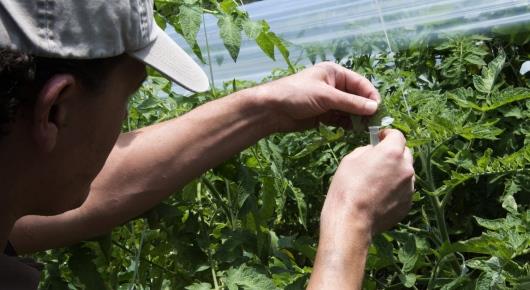With regulation in mind, countries meet to minimize the risks of biotechnology

Biotechnology presents enormous potential benefits for world populations in food security and nutrition, but it is not without risk.
Upon invitation of the Czech Republic and FAO, government officials, renowned scientists and private sector and civil society organizations meet this week in Prague to discuss these issues, exchanging experience on biosafety regulations and engaging in open dialogue on the benefits, risks and regulation of genome editing.
The three-day event, which began on Tuesday, includes representatives from Armenia, Austria, Azerbaijan, Belarus, Bosnia and Herzegovina, Bulgaria, Czechia, Germany, Republic of Moldova, the Netherlands, Poland, Romania, Serbia, Turkey, and Ukraine.
Since the debut of recombinant DNA techniques, governments have applied a two-track policy towards modern biotechnology that can be summarized as “maximizing benefits and minimizing risks.”
Benefits can include improved food security and nutrition, adaptation to and mitigation of climate change and decreased pressure on natural resources. Minimizing risks includes the design and implementation of national biosafety systems and regulations.
Meetings like the one this week in Czechia play an important role.
“It is important to help governments enhance their knowledge base in biotechnologies through the exchange of ideas at all levels,” said Nevena Alexandrova-Stefanova, FAO agricultural innovation systems and knowledge sharing officer. “FAO is committed to providing governments with a neutral framework for open discussions and cooperation and with balanced, science-based information to benefit the public discourse and decisions.”
Today’s world faces unprecedented challenges in agriculture, including the need to nourish a projected global population of 9 billion by 2050 despite declining sources of cheap energy, climate change, and the erosion of biodiversity.
FAO estimates that 80 percent of the additional production necessary to feed the growing population will have to come from yield increases achieved through advances in agricultural research.
“We are convinced that research and innovation have a key role to play in addressing the multiple challenges of today and tomorrow, but complex challenges require complex solutions,” said Alexandrova-Stefanova.
Currently, genome editing is one of the most promising approaches for plant and animal breeding, allowing targeted modification of the genome with unprecedented accuracy. It is affordable, fast, and versatile, suitable for diverse use in medicine, animals and plants – including lesser-known “orphan crops” often grown by smallholders and family farms in the developing world.
However, countries with transition economies in Europe and Central Asia are at different stages of preparation, adoption and enforcement of their national biosafety legislations. It’s important to make these legislations compatible with relevant international agreements, such as those required for accession to the World Trade Organization, the European Union and the Eurasian Economic Union.
Technology alone does not provide an effective solution to all the challenges we have to face, Alexandrova-Stefanova said. FAO emphasizes the importance of establishing an environment that enables farmers and the rest of society to benefit from technological innovations. An essential prerequisite of creating and sustaining such an environment is the public dialogue on knowledge-intense technologies, such as genetically modified organisms (GMOs), new breeding techniques, and even e-agriculture.
29 August 2018, Prague, Czech Republic
